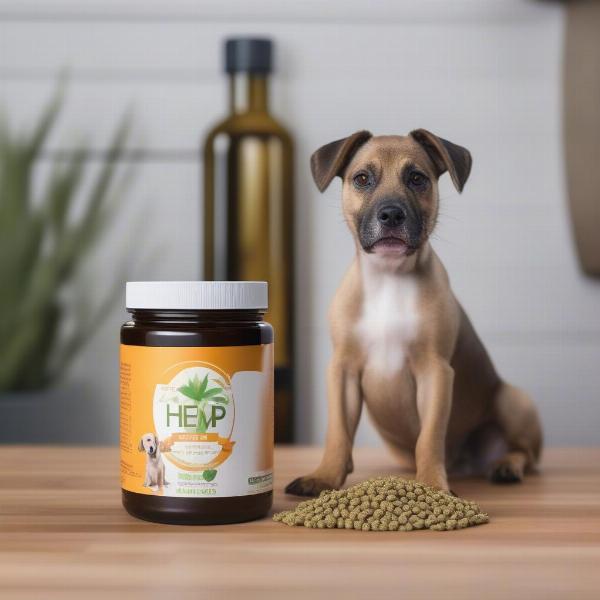Ultra oil for dogs isn’t a recognized, specific product in the canine world. When dog owners search for “ultra oil dog,” they’re likely looking for information on high-quality oils beneficial for their dog’s health, skin, and coat. This article will explore the various oils commonly used for dogs, their potential benefits, and how to safely incorporate them into your dog’s diet.
Understanding the various oils available and their specific benefits can help you choose the right one for your furry friend. From supporting joint health to promoting a glossy coat, incorporating the correct oil can significantly improve your dog’s overall well-being. Let’s dive into the world of beneficial oils for dogs and uncover their potential.
Exploring Beneficial Oils for Dogs
Several oils can benefit a dog’s health, each with unique properties. Some of the most popular options include fish oil, coconut oil, hemp oil, and olive oil.
Fish Oil: A Source of Omega-3s
Fish oil, rich in Omega-3 fatty acids EPA and DHA, is known for its anti-inflammatory properties. It can help alleviate joint pain, improve skin and coat health, and support cognitive function. Choosing a high-quality fish oil specifically formulated for dogs is crucial.
Coconut Oil: For Skin and Coat Health
Coconut oil is a popular choice for improving skin and coat health in dogs. Its moisturizing properties can soothe dry, itchy skin and promote a shiny coat. It can also be applied topically to help heal minor wounds and irritations.
Hemp Oil: A Source of Essential Fatty Acids
Hemp oil, derived from the hemp plant, contains a balanced ratio of Omega-3 and Omega-6 fatty acids. It can support healthy skin and coat, reduce inflammation, and potentially improve joint mobility.
 Hemp Oil for Dogs
Hemp Oil for Dogs
Olive Oil: A Healthy Fat Supplement
Olive oil, a healthy fat source, can be added to a dog’s diet in moderation. It contains antioxidants and can contribute to a healthy coat. However, it’s essential to avoid excessive amounts, as it can lead to digestive upset.
Safely Incorporating Oils into Your Dog’s Diet
When introducing any new supplement to your dog’s diet, start with a small amount and gradually increase the dosage as needed. Always consult with your veterinarian before adding any new supplements, especially if your dog has pre-existing health conditions. They can provide personalized recommendations based on your dog’s specific needs.
Dosage and Administration
The appropriate dosage of oil varies depending on the type of oil, the dog’s size, and their individual needs. Follow the manufacturer’s instructions or consult with your veterinarian for guidance. Most oils can be added directly to your dog’s food.
Choosing the Right Oil for Your Dog
Selecting the appropriate oil depends on your dog’s specific needs. If your dog suffers from joint pain, fish oil might be a good option. For skin and coat issues, coconut or hemp oil could be beneficial. Always prioritize high-quality oils specifically formulated for dogs.
Conclusion
While “ultra oil dog” isn’t a recognized product, various beneficial oils can significantly enhance a dog’s health. By understanding the properties of each oil and consulting with your veterinarian, you can choose the right oil to support your dog’s overall well-being and help them live a happy, healthy life. Remember to start slowly and monitor your dog’s reaction to any new supplement.
FAQ
-
What is the best oil for my dog’s skin? Coconut oil and hemp oil are often recommended for improving skin and coat health in dogs.
-
How much fish oil should I give my dog? The appropriate dosage varies depending on your dog’s size and individual needs. Consult your veterinarian for specific guidance.
-
Can I give my dog olive oil every day? Olive oil can be added to a dog’s diet in moderation, but excessive amounts can cause digestive upset.
-
Are there any risks associated with giving my dog oil supplements? While generally safe, some dogs may experience mild digestive upset when first introduced to oil supplements. Always start with a small amount and monitor your dog’s reaction.
-
Where can I buy high-quality oils for my dog? High-quality oils formulated for dogs can be purchased from reputable pet stores, online retailers, and veterinary clinics.
-
What are the signs of a healthy dog coat? A healthy dog coat is typically shiny, smooth, and free of excessive shedding or dandruff.
-
How can I tell if my dog is benefiting from oil supplements? Improvements in skin and coat health, joint mobility, and overall energy levels can indicate that your dog is benefiting from oil supplements.
ILM Dog is a leading online resource for dog owners worldwide, offering expert advice on dog breeds, health, training, nutrition, grooming, and much more. We are dedicated to providing practical, reliable information to help you care for your furry friend. For personalized guidance and expert advice on dog care, contact us at [email protected] or +44 20-3965-8624. ILM Dog is your trusted partner in responsible dog ownership.